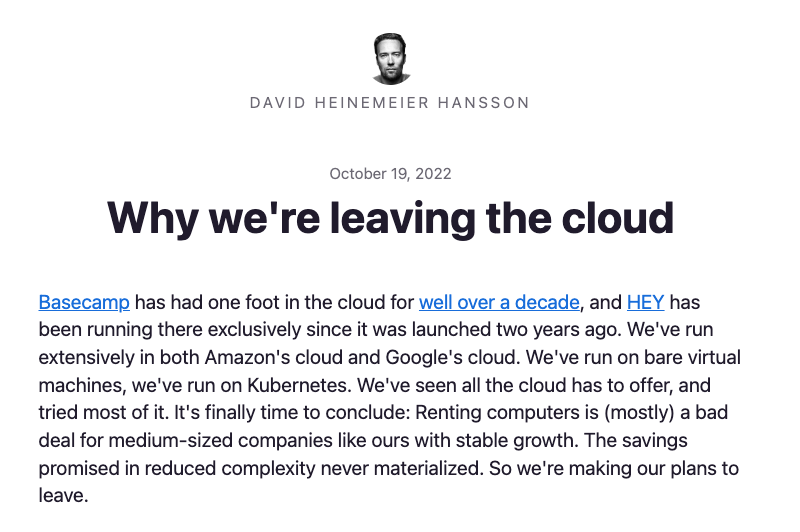Ruby on Rails creator and Basecamp partner David Heinemeir Hansson has published a blog headlined “Why we’re leaving the cloud” that indicates gathering momentum behind the ideas we set out in the cover feature of our quarterly magazine Orbit.
Hansson’s blunt conclusion is: “We’ve seen all the cloud has to offer, and tried most of it. It’s finally time to conclude: Renting computers is (mostly) a bad deal for medium-sized companies like ours with stable growth.”
He acknowledges, “the cloud excels at two ends of the spectrum”; where an application is so simple that a managed service really does save on complexity, often the case when a company gets started; or when the use of your service swings wildly between peaks and troughs.
Absurd premium
But he says: “Neither of those two conditions apply to us today. They never did for Basecamp. Yet by continuing to operate in the cloud, we’re paying an at times almost absurd premium for the possibility that [they] could.” He says Basecamp is currently paying “over half a million dollars per year” for database and search services from Amazon, and asks: “Do you know how many insanely beefy servers you could purchase on a budget of half a million dollars per year?”
Hansson’s comments echo much of what Warren Roy, CEO of Global Relay (our parent company) said in our feature – the Big Three cloud vendors have established a narrative that is a great bit of marketing, but a not-so-great practical solution for many businesses. Hansson references the “marketing coup” of presenting public cloud as a simple solution, one where “The Cloud has beamed so brightly only the Luddites would consider running their own service in its shadow”.
Shape of the internet
And it’s not just cost he sees as an issue. It’s also about “what kind of internet we want”. He goes on: “It strikes me as downright tragic that this decentralized wonder of the world is now largely operating on computers owned by a handful of mega corporations. If one of the primary AWS regions go down, seemingly half the internet is offline along with it.”
The blog post is worth reading in full, and it contains a link to a really interesting podcast discussion on the subject. The narrative is being challenged.













